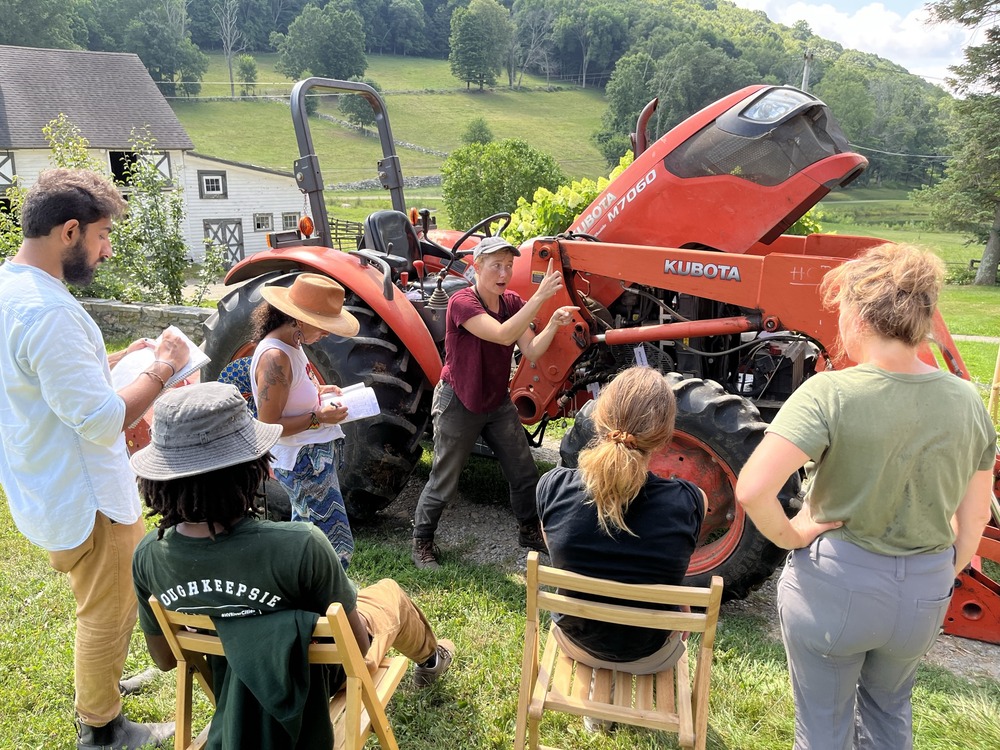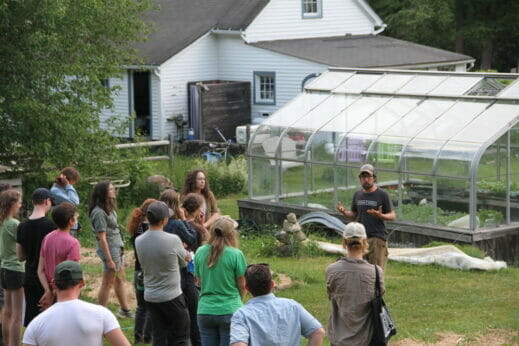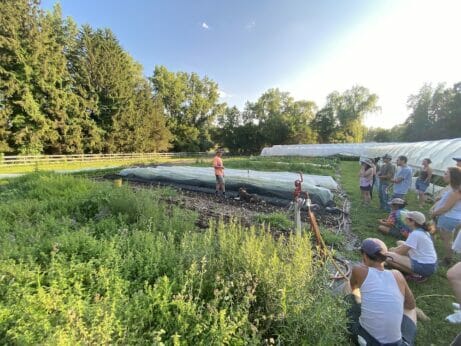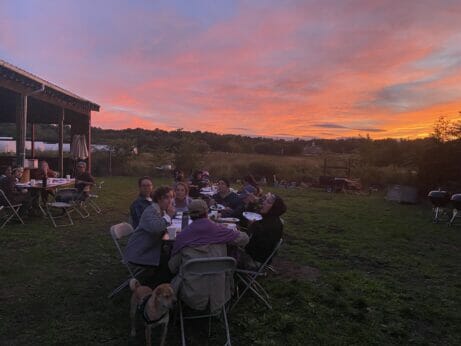Glynwood Center for Regional Food and Farming wants its innovative apprentice program to change the game for young and marginalized entrants into farming.

Sam Rose is worried about the future of farming. The farmer with Four Corners Community Farm in Red Hook, NY points to the rate of aging farmers and the number of farms decreasing due to consolidation. “At some point, I think if we do not get another generation of farmers, we will have difficulty feeding ourselves,” he says.
It’s one of the reasons he signed on to be a mentor farm in the Glynwood Center for Regional Food and Farming’s newly expanded farm apprentice program.
Across the country, this vital and demanding profession is approaching a watershed moment. According to the USDA, the average age of farmers has risen to 57.5 years. Climate change poses threats to conventional methods of farming. Land access is limited by availability and cost.
Glynwood, in Cold Spring, NY, part of the Hudson Valley, is working to confront these considerable challenges through a farm apprentice program geared at training young farmers for a more sustainable and inclusive farming future. Since 1997, the organization has built a reputation of ensuring that the Hudson Valley is a region defined by food, where farming thrives. Its apprentice program, begun in 2008, has a successful track record: Two-thirds of alumni are still farming and more than 80 percent are working in the broader food system, including food justice, sovereignty, education or policy.
Glynwood has recently expanded its program to gear it towards marginalized groups that want to enter the farming and ag space, which has traditionally been dominated by cis white men. It’s one of the few programs nationwide that offer a robust, formal curriculum for new entry farmers.
Glynwood president Kathleen Finlay says that ag schools, multi-generational farms and other programs aren’t meeting the needs of farmer training at this moment. “One of the biggest barriers or the most challenging obstacles is that there’s a dearth of opportunities for farmers to learn to farm in a way that stewards the land, is resilient to the climate crisis [and] is deeply rooted in food justice and food sovereignty,” she says, attributing some of the hurdles affecting first-generation farmers to systemic oppression.
Barriers to entry
Glynwood’s farm apprentice program evolved from informal sessions spearheaded by Dave Llewellyn, director of farmer training since 2008 and a former farm apprentice himself. As the program matured, Llewellyn noticed fewer entry-level opportunities, a result, he says, of the 2019 minimum wage requirement in New York, which prompted many farms to abandon internships or apprenticeships as a means to an end, hiring work crews instead. “We saw nonprofits as an important player in this to make sure that the opportunities continue to exist,” he says. “That’s when we started talking to some partners about this idea of bringing the education component to the table, providing funds to support that work.”
As a member of several agricultural networks in the Hudson Valley and around the country that share knowledge and best practices, Llewellyn often acts as a connector. He recognized the need for a co-ordinated, cross-farm, regional apprenticeship program and that the area’s many small farms are uniquely positioned to accommodate one. To help shape the program and its expansion, he commissioned a report examining training programs around the country, such as Rogue Farm Corps in Oregon and Maine Organic Farmers and Gardeners Association (MOFGA).
The resulting 64-page report confirmed a gap between what was expected and the actual apprentice experience and highlighted the barriers to entry for members of marginalized groups. It’s peppered with candid comments from former apprentices, program managers and mentors.
A queer and trans-identified apprentice addressing the lack of diversity in farming asked, “But are these programs actually a viable, safe space for these kinds of people to go?” Mentors expressed aspirations and concerns, wanting tools to best support apprentices who encountered racism and to pay a living wage. “I don’t know how a farm supports that,” said one bluntly. Another asked, “How do you actually teach while getting so much stuff done?”

In-class learning at Glynwood supplements hands-on field work at off-site apprenticeships. (Photo courtesy of Glynwood Center for Regional Food and Farming.)
Learning and outreach
The apprentice program includes in-field work, 60 hours of classroom time covering topics such as pest management, tractor safety, holistic visioning of goals, food sovereignty (the right of people to be able to produce and/or procure healthy and culturally appropriate food in a sustainable manner) and compassionate communications training. Apprentices receive a stipend of minimum wage or above, a healthcare reimbursement account, free and discounted vegetables and meat from Glynwood, and renumeration for transportation to the weekly classroom sessions, as well as accruing vacation and sick days. Some housing is available. Funding for the pilot year in 2022 came from individual donors; the program is currently supported by a three-year grant from the USDA’s Beginning Farmer and Rancher Development Program that Glynwood was awarded last summer.
This initiative fits naturally into Glynwood’s work and ethos of inclusivity.
The organization strives to support participants from a diverse range of backgrounds in its programs. As part of the expansion, it included past and present program participants in program refinement and design. To conduct intentional recruiting, Glynwood has been building relationships with local farms by participating in volunteer workdays and partnering with organizations such as GrowNYC, with which it created a farmer training initiative called Pathways to Farming.
Mentoring and support
So as not to dilute the experience for the five apprentices onsite at Glynwood, Llewellyn and his team created a decentralized model, partnering with five farms to host apprentices and act as mentors. Each of the farms—Four Corners Community Farm, Maple View Farm, Ecological Citizen’s Project, Phillies Bridge Farm Project, Choy Division Farm and Rise & Root Farm—have participated in Glynwood programs, so a trust and comfort level are already established.
The expansion was piloted with 15 apprentices, 10 off-site. Seventeen are participating this year, which runs approximately from March to November. “It’s a very diverse group that has been intentionally cultivated here at Glynwood,” says current apprentice Sebastian Jindra-Cotilla, “bringing in various different values and trying to integrate them into one productive harmonious agricultural experience.” That’s one of the aspects that drew the first-generation Latino-American to the program, along with its generous compensation package and educational component. He says he felt “exploited by my employers for my labor” at a previous experience where learning was not prioritized.

Classroom topics include best practices in planting and disease and pest management. (Photo courtesy of Glynwood Center for Regional Food and Farming.)
Each mentor farm receives a $3,000 stipend for its commitment and as compensation for the apprentice’s classroom time. Mentors are required to attend an orientation, undergo anti-racist and team-building training, participate in frequent, specific check-ins with the apprentice and Glynwood team during the season and provide program feedback. They have access to online repositories of lessons developed by Glynwood and can network with other mentors.
Rose welcomes the help, money and opportunity to share knowledge as a mentor. He says designing a curriculum that is not just “grunt work” can be a burden for the farmer, so he’s grateful Glynwood has the expertise and ability to do so. “Why should each farm mentor reinvent the wheel?” he asks, noting that apprentices receive a richer experience and a standardized and wider breadth of knowledge.
Impact beyond the farm
Former Glynwood apprentice Ellie Brown, who served as a mentor last year, was grateful for the housing provided when she was an apprentice. “Paying people and housing them are two big things people don’t have to figure out on their own,” she says. Paying minimum wage, says Llewellyn, does not make the opportunity equitable or accessible to all, but they ensure people are “reasonably compensated” by tracking hours, which is not common practice in apprenticeships.
Including social justice, food justice and inclusivity aspects adds more meaning to the program, says Brown, who is starting a farm this season, particularly because farmers already have a lot on their plate. “I think that this farming community in the Hudson Valley, a lot because of Glynwood, is at the forefront of being open and allowing everybody to have their voice no matter who they are. That’s a huge thing.”

Sharing meals after class fosters connection between the apprentices and Glynwood staff. (Photo courtesy of Glynwood Center for Regional Food and Farming.)
Jindra-Cotilla appreciates the opportunity to experiment in an accepting space, very different from previous farm experiences. “It goes to prove that the cultural aspect of agriculture is really, really important. We’re doing more than just growing food. That sort of anchors our activities; but at the end of the day, what we’re trying to do is create culture, to foster positive ways of being in relationship to one another, to the land. That means obviously including marginalized voices.”
Rose agrees. When apprentices are taken for granted, “that excludes a lot of people,” he says, and “misses a lot of potential for growth of these future leaders, for the institutions themselves, for making a more inclusive, equitable society.”
“The resulting 64-page report…” Is the report available?
This program is a crucial step in addressing the challenges faced by the farming community, especially with the aging of farmers and the need for a younger generation to take up the mantle. It’s heartening to see their focus on inclusivity and providing opportunities for marginalized groups, which can help create a more diverse and resilient farming future. Initiatives like this play a vital role in sustaining our food systems. If you need to write a case report, you can find help https://writinguniverse.com/case-study-writing-service/ here. It’s amazing writing service that helped me a lot in professional writings and I just saved… Read more »